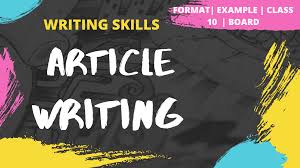How to Top Google By Article Writing
Search engines determine their ranks based on two factors:
1) Is your site working? (For some keywords)
2) Is your site important? (More links return to your site from other sites)
It is only when you experience both of these assumptions that you are assured that you will have an impact. Your success rate depends on how hard you try and how well your competitors (and how hard they try).
Preparing your site with keywords is the easiest part. ) www.divinewrite.com/googlelinkfilter.htm). But it can be done; and you don't need a big budget.
The key to including Google in the budget is to write articles.
Here's how it works…
STEP 1) You are an expert in your field so you have the knowledge that other people want.
STEP 2) Writes a useful article - share your knowledge and expertise.
STEP 3) You submit your article to sites known as “Post Article” Online.
STEP 4) Publishers of online newsletters, zines, etc. They collect content on these sites for free.
STEP 5) Useful, well-written essays are taken by thousands of publishers from all over the world.
STEP 6) The only condition is that they must publish the article with a link that works on your site.
STEP 7) 300 people publish your article - you get 300 links back to your site.
Below are frequently asked questions about article writing that will help you write your articles and manage your campaign.
Q) What should I write about?
A) Write about what you know. Make sure it is related to your business (so you can use the keywords you want to rate) and it is helpful (so it is published). For example, if you are a manufacturer of industrial plastics, you could write an article - or a series of articles - on how to best handle teflon drilling before installation. When you think about it, you will probably find that there are hundreds of helpful articles you can write. Some of them may be listed in part in your instruction manual or in the installation guide, etc. Another good idea is to think about all the questions that customers and potential buyers ask. These questions show you what people are interested in. If you write an article answering all of these questions, you will be published, and you will prove yourself a reliable expert. (You can also reduce phone support time!)
Q) How long should my article be?
A) Top articles only long if needed. Keep it short and fun - there is nothing wrong with a 400 word article. In the same way, if you need 1500 words to say everything you need to say, that's fine too.
Q) What kind of writing should I use?
A) Just write about the style in which your audience will be comfortable. If they come from an old school, don’t write like me. Do not use pressure, do not complete sentences with adverbs, and do not start sentences with “no” or “but”. But if they are not old school, just use conversational English. In fact, the more you add to the article, the more engaging it will be. The key is to make it readable.
Q) Should I focus on keywords?
A) Yes! Yes! Yes! Any SEO website writer will tell you that just as you need to optimize your website with keywords, so you should also increase your articles. If possible, turn keywords into links back to your site. And always try to include keywords and the title of your article. And don't worry about appearing like Spam; if your article provides high quality content and guidance, it will not be considered as spam by search engines even if it is very rich.
Q) Where can I send my article?
A) There are hundreds, if not thousands, of sites posted on the Internet. There is so much to add here. Search for "post articles" and find only the ones that work best in your industry and offer the most subscribers. Alternatively, you can purchase a list.
Q) Who will publish my article?
A) People often publish pre-published articles because they want "paper eyes". In other words, they want to generate traffic on their site. Helpful articles are just one way. It also sets them apart as trustworthy authorities in certain matters. It also improves customer loyalty. There are hundreds of thousands of companies (maybe even millions) that publish online newsletters, zenes, and article pages. No matter what your industry is, you will definitely find a few who are interested in what you are saying. In fact, when a few publishers see you as a good source of content, they always come back looking for more (and email you and ask if you can send them directly).
Q) How will I know when my article has been published?
A) As one of the conditions for publication, you may request that the publisher inform you when they use your article. Of course, most people do not bother to do this, so it is a good idea to set up Google Alert (http://www.google.com/alerts) to let you know when your URL is published on a web page. Google doesn't take it all in, but it does take a lot. Whenever you receive a warning, you verify that the article does not change and that the link back to your site is active.
Q) Will the publisher change my article?
A) No, usually not. Editing articles is an additional task. In fact, that's why publishers like good articles and consistent content providers - because that means they don't have to do any extra work. I have had many articles published, and I do not remember a single article being changed without my permission. If you are concerned about it, you can order not to change the article in your publishing conditions.
Q) Can I get an SEO writer to write and submit my articles?
A) Yes. Any copywriter of SEO should know





Comments
Post a Comment